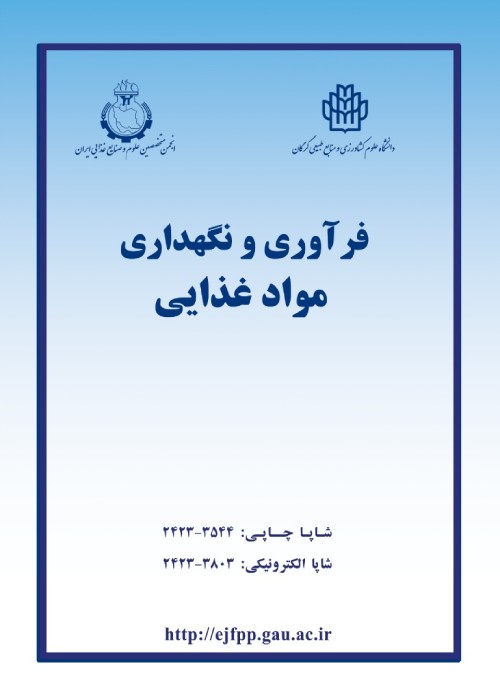Effect of NaCl and KCl salts and pH on properties of fenugreek seed gum
Author(s):
Article Type:
Research/Original Article (دارای رتبه معتبر)
Abstract:
Background and objectives
The use of hydrocolloids in food industries has dramatically increased in recent years. Although concentrations of less than 1% are usually used in food systems, their presence can have important effects on texture, taste, shelf-life, and organoleptic properties of foods. The importance and use of hydrocolloids depend on their functional properties, which are affected by molecular structure and concentration of hydrocolloids as well as their reaction with other food compounds (salt, sugar, fat, and protein), pH, and processing conditions (such as temperature). Studying factors affecting the extraction of hydrocolloids is particularly important for finding optimal extraction conditions. We studied the effect of treatments of aquatic extraction process on chemical and rheological properties of fenugreek seed gum.
Materials and methods
In this study effects of 3% and 5% sodium and potassium chloride salts and pH of 3 and 6 on chemical compositions Including were studied. Protein content, fat, ash and moisture were determined according to AOAC Standard methods (2005). Total sugar was determined by phenol-sulfuric acid method by using D-glucose as standard at 490 nm. Rheological properties of fnugreek seed gum were carried out using a rotational viscometer Brookfield for gum concentrations (0.5-1%) at 25 °C. The flow behavior index (n) and consistency index (k) values were computed by fitting the power law model. means were compared using the LSD test (p <0.05) in SPSS v. 16.
Results
Extraction variables had significant effects on rheological parameters, chemical composition and extraction efficiency of green seed resin. A substantial part of fnugreek seed gums were composed of polysaccharide (84.22±0.63% maximum) in the sample treated with KCl 3%, and pH 3. The efficiency of gum extraction was significantly influenced by the type and concentration of salt. However, pH had no significant effect. The apparent viscosity decreased with increasing shear rate in all samples, which indicated strong shear thinning behavior with np
Conclusion
The highest gum extraction yield of fenugreek seed was 17.5±1.63%, which was obtained with pH 3 and potassium chloride 3%. The power law model adequately describes the non-Newtonian behavior of green seed resin at various values of pH in the presence of salts with regression coefficient in excess of 95%. Fitness of data in the model showed that consistency coefficient (Kp) and flow behavior index (n_p) decrease with increasing concentration of salt, while consistency coefficient and flow behavior index behaved opposite each other with increasing pH from 3 to 6 and resin concentration from 0.5% to 1%. Potassium chloride had the highest effect on viscosity of resin solution and sodium chloride had the lowest effect, with the same concentrations.Keywords:
Language:
Persian
Published:
Electronic Journal of Food Processing and Preservation, Volume:11 Issue: 1, 2019
Pages:
49 to 64
magiran.com/p2005266
دانلود و مطالعه متن این مقاله با یکی از روشهای زیر امکان پذیر است:
اشتراک شخصی
با عضویت و پرداخت آنلاین حق اشتراک یکساله به مبلغ 1,390,000ريال میتوانید 70 عنوان مطلب دانلود کنید!
اشتراک سازمانی
به کتابخانه دانشگاه یا محل کار خود پیشنهاد کنید تا اشتراک سازمانی این پایگاه را برای دسترسی نامحدود همه کاربران به متن مطالب تهیه نمایند!
توجه!
- حق عضویت دریافتی صرف حمایت از نشریات عضو و نگهداری، تکمیل و توسعه مگیران میشود.
- پرداخت حق اشتراک و دانلود مقالات اجازه بازنشر آن در سایر رسانههای چاپی و دیجیتال را به کاربر نمیدهد.
In order to view content subscription is required
Personal subscription
Subscribe magiran.com for 70 € euros via PayPal and download 70 articles during a year.
Organization subscription
Please contact us to subscribe your university or library for unlimited access!



